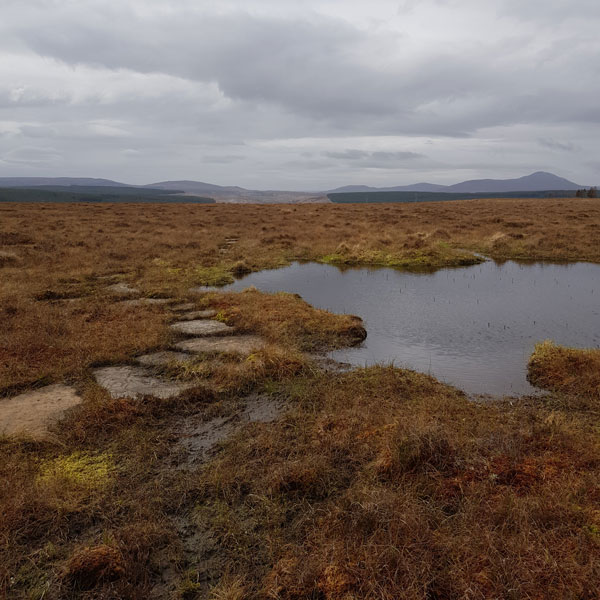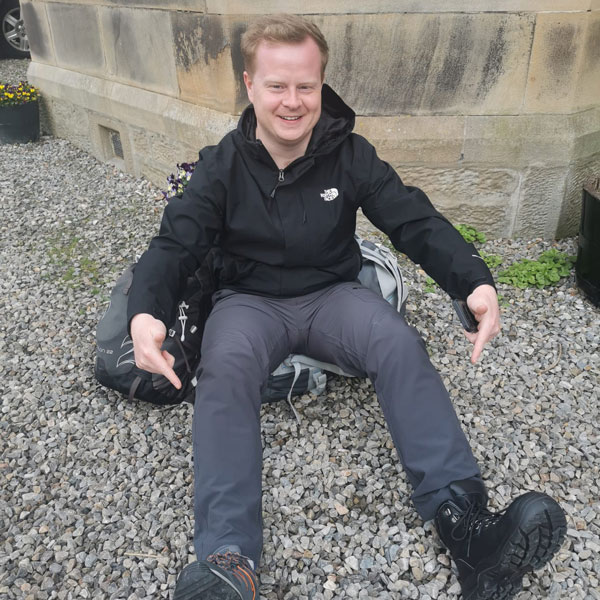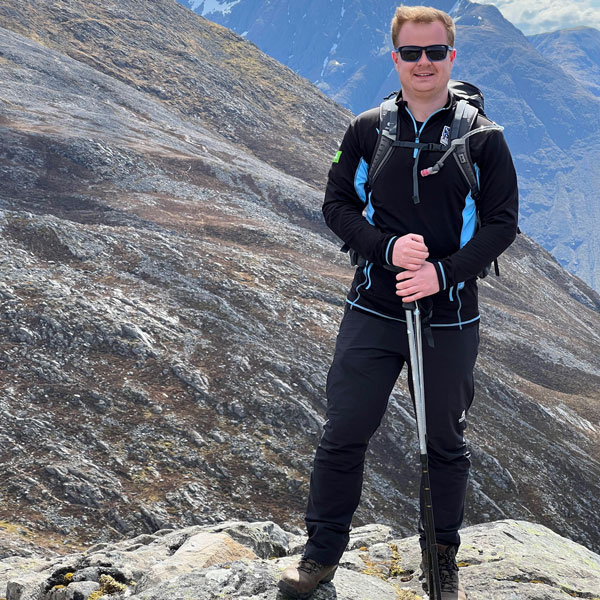
Centre for Sustainable DevelopmentDonald Robertson's Hydro Nations Fieldtrip
Donald Robertson is a Year 1 PhD student and Hydro Nation Scholar based in Civil & Environmental Engineering at the University of Strathclyde.
The field trip
In early May I took part in the Hydro Nation Scholars Programme’s biennial summer field trip. The trip, focusing on exploring Scotland’s water environments, began in Inverness and traversed across northern Scotland before finishing up in Aberdeen five days later.
Through the course of the week, we were lucky enough to visit a range of important water environments and meet the experts who research, care for, and manage them. From £86 million flood defence schemes to 200-year-old canals, modern hydroelectric schemes, national nature reserves and even a whiskey distillery where we got to try a little sample (Uisge beatha – water of life, after all).
At Forsinard Flows Nature Reserve, located in the Flow Country in the far north of mainland Scotland, we spent time walking through the vast blanket bog and discussed the important role that peatlands play in efforts to tackle climate change. Despite their importance as carbon sinks we learned about some of the pressures that peatlands face; forestry plantation activity, energy development, biodiversity loss, hydrologic degradation and many more. It was heartening to hear about some of the research that is ongoing to help preserve and restore peatlands but it was clear that there is a lot of work still to be done and how enduring the risks are.


Another memorable site was Scottish Water’s new waste water treatment works at Inverurie. With very little previous knowledge of wastewater treatment, it was fascinating to learn more about the process and about how new technological innovations are being used to improve services while also reducing the site’s energy consumption.
The group also visited Dunrobin Castle, a beautiful building built along the sea cliffs of the east coast. Being the historic seat of the Earls and Dukes of Sutherland, the castle and nearby statue of the first Duke of Sutherland have controversial connections to the local area dating back to the highland clearances. We used the visit to springboard a discussion on the roles that; history, culture, land-use change, land ownership, and symbolism have on both our historic and modern-day interactions with water and the wider environment. The conversation also raised issues of justice, fairness and, responsibility – extremely relevant topics in relation to sustainable development and climate change.
As well as exposing us to new water landscapes, uses, and challenges the trip brought together the 20-odd PhD students that comprise the scholar's programme for some highly enjoyable social time. As a new scholar (Oct 2021 start) this was a great opportunity for me to spend time with peers who are spread across a host of universities, disciplines, and stages of study/research.
Key insights
- I gained an appreciation for the complexity involved in protecting and managing our water environments. Just as water touches every part of society, every part of society touches water. The risks and influences to the long-term health and resilience of our water environments are ever-changing. Whether it's changes in land use, tourism patterns, emerging pollutants or climatic changes, there are no ‘simple’ solutions to protecting our water resources
- I also realised the importance in working across disciplines. None of our current or emerging challenges can be effectively tackled with a singular approach. Interdisciplinary research which pushes and challenges the ‘traditional’ methods and practices is required if we are to sustainably manage our water resources and protect our natural environments. My research into the role that citizen-derived data can have in water management practices aims to directly contribute to this discussion
- I understand the visible and invisible influences of water on our lives. Our water environments, and the resources we derive from them, are influenced by and influence so many interconnected aspects of our society. While some influences are immediately obvious and visible, like urban flooding events, others influences are subtle and less visible such as the benefits derived from blue greenspaces or the connection between water environments and our net-zero transitions. How we value, understand, and discuss our water environments with the wider public is important
- I see the role of research in shaping our future. The trip helped highlight just how important horizon scanning is in research. Throughout the trip, we saw a number of examples where unintended consequences of policy decisions had lasting long-term impacts on the land and environment. Identifying future research needs, and fully considering the impact that policy change can have on water resources, environments, and the interrelationships that exist between society, nature, and water is vital. What at first may seem disconnected, such as changes to industrial tax incentives, can and does have lasting impacts on our natural environments
How the trip has influenced my thinking and research
Getting out into the field and seeing so many examples of how important our water resources and water environments are to wider society was fantastic, especially after the last few years of restricted travel. The exposure has really broadened my respect for how relatively narrow concerns, like protecting drinking water supplies, are part of a much broader conversation around efforts to protect and restore natural environments, build resilience to future challenges, create just transitions, and sustainable development. While the interconnected nature of these challenges is not always obvious, the breadth and complexity in understanding them must be matched by our response, utilising a range of expertise, skills, and approaches.
In my own work, I hope to further embrace interdisciplinary methods in upcoming fieldwork. I intend to spend time considering how wider contexts; economic, social, political, and environmental influence the use of data and information in decision-making processes with respect to water. With an interest in non-traditional sources of data, I also would like to explore how our choices in what we measure, what we collect, what we present, and what we understand influence our management of water.
Getting to spend time with the other scholars has really motivated me to seek out new ideas and perspectives – especially from outside my own field. The trip has also encouraged me to get involved in conversations outside of my own comfort zone.
Finally, I would like to say a huge thank you to the Hydro Nation Scholars Programme and especially to Prof Bob Ferrier, Dr Rowan Ellis, and Linda Wood who put so much effort into ensuring the trip was a success. Also very grateful to all the people who gave up time to spend time and talk with the group about their work and research – it was such great exposure to all the efforts taking place in Scotland. I really enjoyed the whole week and look forward to spending more time with the group in the near future.

If you’d like to learn more about Donald’s research, the scholars programme, or discuss water & sustainability challenges more generally please get in touch at donald.j.robertson@strath.ac.uk or follow him @don_robertson1 on Twitter!